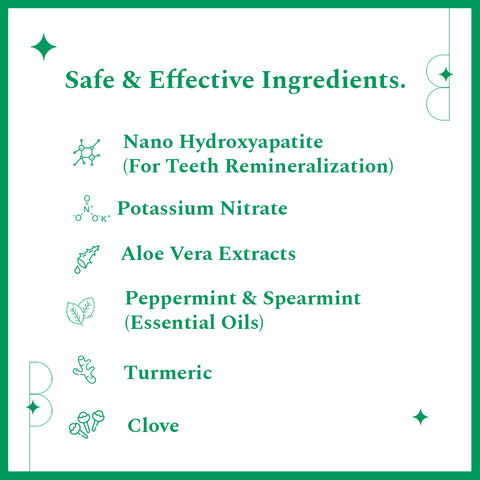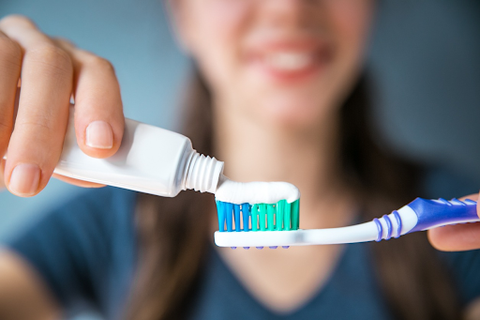Introduction
In the bustling world of dental care, where innovations and natural remedies converge, lies a common concern that affects many: tooth sensitivity. It's a condition that can transform the simple act of enjoying your favourite hot or cold treats into a painful ordeal. At Perfora, we understand the importance of not only treating sensitivity but doing so with products that align with your wellness and environmental values. Hence, this blog will delve into the world of toothpaste for sensitive teeth, highlighting the benefits of SLS-free products and the ancient practice of oil pulling. Join us as we explore how sensitive paste offers relief and promotes oral health.
Key Takeaways
- Tooth sensitivity, or dentin hypersensitivity, is caused by worn enamel or exposed dentin, leading to pain with hot, cold, sweet, or acidic stimuli.
- Choosing the right toothpaste for sensitive teeth, such as SLS-free options with potassium nitrate and stannous fluoride, is crucial for managing sensitivity effectively.
- The active ingredients in sensitive toothpaste work by de-sensitising nerves and forming protective barriers over exposed dentin, gradually reducing pain triggers.
- For best results, use sensitive toothpaste consistently, with a soft-bristled toothbrush, gentle brushing technique, and avoiding immediate rinsing after brushing.
Understanding Tooth Sensitivity
Tooth sensitivity, or dentin hypersensitivity, occurs when the enamel protecting our teeth wears down, or when gum recession exposes the underlying surface, the dentin, leaving the tooth roots vulnerable to external stimuli. This exposure leads to discomfort or pain when encountering hot, cold, sweet, or very acidic foods and drinks. The reasons for this wear and tear vary from aggressive brushing habits to acidic dietary choices, highlighting the need for a good toothpaste for sensitive teeth that not only alleviates symptoms but also addresses the root causes of sensitivity.
Choosing the Right Toothpaste for Your Sensitive Teeth
Selecting the right toothpaste for sensitive teeth and gums is crucial in managing sensitivity effectively. The market is flooded with options, but the key is to look for products that not only promise relief but are also aligned with a holistic approach to oral health. SLS-free toothpastes, for example, offer a gentler alternative for those with sensitive teeth, avoiding the harshness of sulphates that can further irritate sensitive gums and teeth. When choosing a sensitive paste, it's essential to consider its ingredients, benefits, and how it fits into your broader oral care routine.

The Special Ingredients in Sensitive Paste
When selecting a toothpaste for sensitive teeth, understanding the active ingredients is crucial. Sensitive pastes, or toothpastes formulated for sensitive teeth and gums, often contain several key ingredients designed to alleviate discomfort and protect your teeth. The most common among these are potassium nitrate and stannous fluoride.
Potassium Nitrate: This compound works by calming the nerves in your teeth. When used regularly, potassium nitrate penetrates the tooth enamel and reaches the nerve, acting as a buffer to shield it from pain triggers such as hot, cold, or sweet stimuli. This is why many consider it a good toothpaste for sensitive teeth, as it directly addresses the root cause of sensitivity.
Stannous Fluoride: Beyond its role in cavity prevention, stannous fluoride also helps with sensitivity. It creates a protective barrier over the exposed dentin, the sensitive part of the tooth, thus reducing the transmission of pain signals. Stannous fluoride is also effective in combating gum disease, adding an extra layer of protection for those with sensitive teeth and gums.
The Mechanism Behind Toothpaste for Sensitive Teeth and Gums
The mechanism by which toothpaste for sensitive teeth works is fascinating and multifaceted. Upon application, the active ingredients in sensitive paste, such as potassium nitrate and stannous fluoride, begin to interact with the tooth enamel and dentin. Here’s how they work:
- Nerve Desensitisation: Potassium nitrate works by desensitising the nerves inside the teeth, effectively reducing the pain response to typical triggers. This process doesn't happen instantly but builds up with regular use, providing gradual relief from sensitivity.
- Barrier Formation: Stannous fluoride acts by forming a protective barrier over the dentin surfaces. This barrier prevents external stimuli from reaching the nerves, thereby reducing the sensation of pain. Additionally, this layer helps in remineralizing the teeth, further strengthening them against decay and erosion.
Effective Use of Sensitivity Toothpaste for Best Results
For maximum relief from tooth sensitivity, merely choosing a good toothpaste for sensitive teeth is not enough; how you use it matters significantly. Here are some tips for effective use:
- Consistent Use: Use your sensitive paste at least twice a day, every day. Consistency is key to building up the protective barrier and desensitising the nerves in your teeth.
- Soft-Bristled Toothbrush: Pair your toothpaste with a soft-bristled toothbrush. This reduces the mechanical irritation to your gums and teeth, preventing further abrasion to the sensitive areas.
- Proper Brushing Technique: Brush gently in a circular motion. Avoid scrubbing too hard, as this can wear down the enamel and exacerbate sensitivity.
- Do Not Rinse Immediately: After brushing with toothpaste for sensitive teeth and gums, try not to rinse your mouth immediately with water. Instead, spit out the excess toothpaste and let the remaining paste continue to work on your teeth for a few minutes longer.
Conclusion
Tooth sensitivity is a prevalent concern that can significantly impact daily life, yet it is manageable with the appropriate oral care strategy. Integrating a toothpaste specifically tailored for sensitive teeth, such as Perfora Anti-Sensitivity Toothpaste, into your dental hygiene routine can greatly alleviate discomfort and enhance oral health. Perfora's formulation, which includes active ingredients like Nano Hydroxyapatite and Potassium Nitrate, is designed to offer relief from sensitivity while promoting tooth enamel repair. Alongside adhering to proper application guidelines, maintaining regular dental check-ups is crucial for identifying and treating any underlying causes of sensitivity. Furthermore, for those seeking additional natural relief methods, we encourage exploring a variety of home remedies for sensitive teeth. Complement your use of Perfora's toothpaste with the insights and suggestions found in our article on home remedies for sensitive teeth, providing a well-rounded approach to managing sensitivity.Frequently Asked Questions on Toothpaste for Sensitive Teeth
Q1. What toothpaste stops sensitive teeth?
Toothpaste specifically formulated for sensitive teeth, often containing potassium nitrate or stannous fluoride, can significantly reduce sensitivity.
Q2. Can toothpaste fix sensitive teeth?
While toothpaste for sensitive teeth cannot "fix" the underlying causes, it can provide relief from sensitivity symptoms.
Q3. How can I fix my sensitive teeth?
Improving your oral hygiene routine, using a toothpaste designed for sensitive teeth, and consulting with a dentist for targeted treatments can help manage sensitivity.

